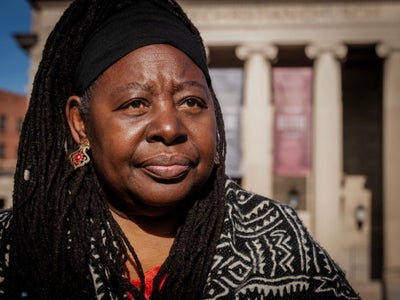Did You Know The Concept Of Reproductive Justice Came From Black Women? Here’s Why That’s Important

[ad_1]

Since the Supreme Court overturned Roe v. Wade last summer, the term “reproductive justice” has made its way into the national conversation to not only fight for abortion access, but to address bodily autonomy as a whole. The term has been widely referenced to address these issues. But it was first conceptualized by a collective of Black women leaders in 1994, and its true meaning is much more expansive and revolutionary than its contemporary context might imply.
Reproductive justice began as a movement intended to center women of color – specifically Black women – and other marginalized people in the fight for reproductive rights. Its definition encompasses not just the choice to have children, but also the fundamental human right “to maintain personal bodily autonomy, have children, not have children, and parent the children we have in safe and sustainable communities.”
The visions of Loretta Ross, Dr. Toni M. Bond and “Able” Mable Thomas – who referred to themselves as Women of African Descent for Reproductive Justice – was transformative. It targeted broader systems of oppression to advance reproductive freedom. Woven into this piece of Black history is a critical lesson: to create effective policy solutions that advance justice and equity in our communities, we have to look at the deep roots of the issues we’re facing and understand that they are interrelated. When we begin to address the myriad issues we are facing as connected, structural problems instead of isolated crises, we can find real solutions instead of band-aids.
The fall of Roe triggered a reproductive health crisis in our country. We are also simultaneously facing a multitude of dire issues in our communities that beg our attention – institutionalized racism, threats to democracy, economic inequality, climate disasters, and other collective struggles. Economic barriers, such as lack of insurance or unlivable wages, can severely restrict access – making it a freedom only for those with economic means.
The same is true for our right to live in safe, sustainable communities. This involves living free of interpersonal violence, identity-based violence, police violence, and other forms of institutionalized violence. It also involves the right to be safe from environmental harm caused by climate disaster and have access to safe, affordable housing. If we are not safe to exist in our communities, we are not able to safely parent our children or raise healthy families. We cannot lead healthy reproductive lives if we lack basic safety.
We also see the value of an intersectional framework like reproductive justice when looking at the issue of legality versus access when it comes to health care. The legality of reproductive health care like abortion and contraception means nothing if it is not accessible to those who need it – that’s why Roe v. Wade was never enough.
Solving multiple crises at once might seem like an unreasonable and insurmountable task, but the reality is that intersectional frameworks for change actually make movement building easier and more successful. When we recognize our movement’s place in that of a larger effort for systemic change, we build people power, multiply our resources, and form stronger constituencies that are better equipped to take on these compounding challenges.
Black women are up to the task and are already demonstrating what it looks like to put these intersectional frameworks into practice. We have for years, and not just in the carving out of the reproductive justice framework that occurred because of the continuous neglect of the exclusionary abortion access movement. Black women have proven our preparation and savvy in most freedom movements in this country. The Women’s Suffrage, Civil Rights, LGBTQ+, and Feminist movements all saw Black women at the forefront, on the frontlines, yet sidelined and often abandoned when structural change became available to the movement’s broader base. Reproductive justice confronted that phenomenon and demanded a much-needed change.
We would not have come nearly as far as we have in the fight for reproductive freedom without the visionary leadership of the Black women founders of the reproductive justice movement, our foremothers, if you will. If we are to continue their legacy and drive justice forward – for abortion rights and beyond – we must take lessons from this history and understand that our collective futures are deeply connected to one another. Movements have built upon this wisdom for decades – now, it is up to policymakers to put that wisdom into practice.
Kwentoria A. Williams is the Senior Communications Director for URGE: Unite for Reproductive & Gender Equity.
[ad_2]
Source link
